
Cygnus Technologies a Global Force in Impurity Testing for Biologicals
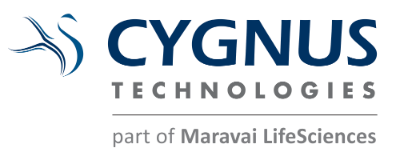
Ken Hoffman, a veteran of the clinical diagnostics industry, was living and working in Boston some 20 years ago when he chose to move his new startup company, Cygnus Technologies, to North Carolina.
“I was tired of traffic congestion and the weather in Massachusetts and decided I’d come to the Sunbelt,” he recalls. When not working, he wanted to golf, fish and enjoy the beach, and the coastal town of Southport, population 3,600, seemed ideal.
At first Hoffman was worried he wouldn’t be able to attract talented employees in the new location. But he soon found that there were plenty of capable high school and college graduates in the greater Wilmington area who were looking for bioscience jobs.
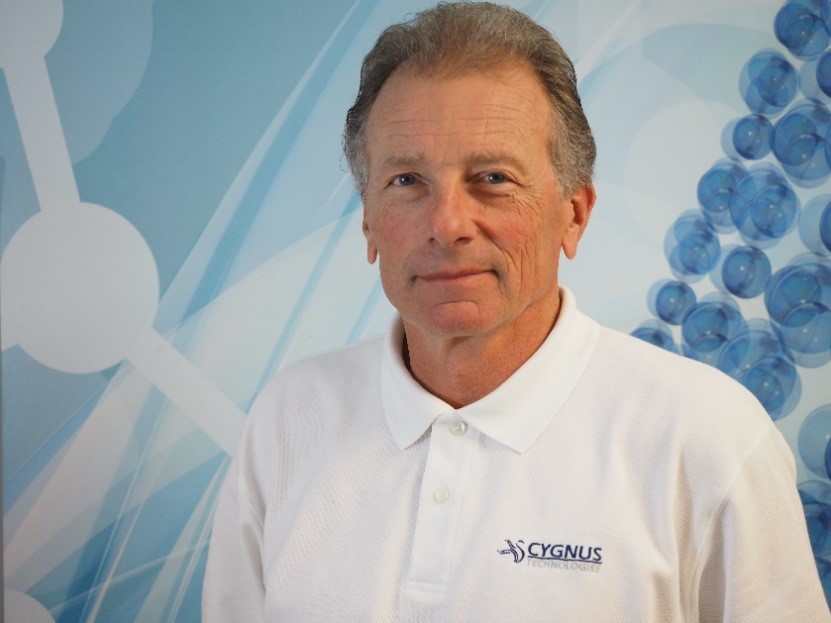
“They were diamonds in the rough and just needed an opportunity,” he says. “I had plenty of raw talent and was able to pick and choose some very good people that we subsequently developed.”
He also had no problem attracting experienced people like him who abhorred long urban commutes and wanted a relaxed coastal lifestyle.
“So Southport has worked out great,” he says.
Today, Cygnus has grown to include 33 employees, with more to be hired this year and next.
They work in a 20,000-square-foot modern building ̶ partly powered by solar energy ̶ that includes offices, R&D labs and manufacturing operations. The company is located just minutes away from Atlantic beaches, the Cape Fear River, the Intracoastal Waterway and Bald Head Island State Natural Area.
The presence of Cygnus has made Southport an unlikely global center of expertise in a growing niche of the biopharmaceutical industry: immunoassay kits and services for ensuring the purity and safety of drugs, vaccines and therapeutics.
Immunoassays are biochemical tests that use an antibody or antigen to measure the presence or concentration of a molecule in a solution. Cygnus sells about 80 different immunoassay kits for protein impurity testing and another 600 ancillary products such as reagents, buffers, antigens and antibodies. It also provides custom antibody and assay development services.
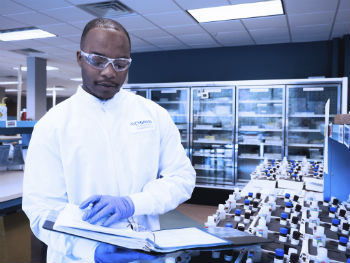
The immunoassay kits, which typically sell for $500 to $700 each, account for most of the company’s revenue, Hoffman says. The best sellers are those used in two popular protein-production systems: Chinese hamster ovary cells and E. coli bacterial cells.
Biopharmaceutical companies of all sizes buy products and services from Cygnus.
“We count among our customer base virtually every company in the world that manufactures biopharmaceuticals,” Hoffman says. “Every company uses at least some of our products.”
Cygnus sells domestically and to companies in Western Europe, China, India, Indonesia, Japan, Malaysia, Singapore, South Korea, Taiwan and other countries through international distributors.
“We’re all over the world, and more than half our business is international,” Hoffman says.
Seeing and seizing an opportunity
”Ken, in his leadership at Cygnus Technologies, exemplifies the entrepreneurial spirit and community focus we see with so many life science companies and leaders in southeastern North Carolina,” says Randall Johnson, executive director of the North Carolina Biotechnology Center’s Southeastern Office.
“Cygnus Technologies’ business partnerships and successes have national and international reach. We’re fortunate Ken has chosen to call our region home for his company and family.”
Hoffman created Cygnus in 1998 as the biopharmaceutical industry was ramping up its use of recombinant DNA technology to make biologics. Gene-transfer techniques allowed human therapeutic proteins to be produced in microbial and animal cells cultured in large stainless steel tanks.
“One of the challenges for the industry was the issue of purity,” Hoffman says. In addition to making the desired therapeutic protein, host cells naturally produce a litany of other proteins as unwanted byproducts.
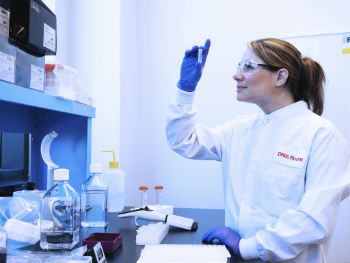
“Those cellular proteins were deemed a potential safety risk should they get into the patient,” he says. The unwanted proteins can cause side effects in patients and reduce the effectiveness and shelf life of therapeutics.
“There are all kinds of reasons why you would want to get the impurities down as low as you can,” Hoffman says.
To minimize impurities, biopharmaceutical companies need to separate their therapeutic protein from the hundreds or thousands of other proteins normally produced by the host cells. But in the early days, companies struggled to find the best analytical methods for detecting and characterizing proteins.
As the industry turned to immunoassay technology as the best solution, companies increasingly called Hoffman, who had two decades of experience developing immunoassays for infectious diseases, cancer biomarkers and metabolic diseases in the clinical diagnostics industry.
“As a result of that, I saw a significant opportunity in the biopharmaceutical field,” Hoffman says. With that recognition, Cygnus Technologies was born, giving biopharma companies a new source of analytics expertise for ridding impurities from their products.
“By outsourcing they can get that work done in a shorter period time, and they can get it done for less money than trying to develop it in-house,” Hoffman says. “You’re more likely to get regulatory approval more easily or faster by outsourcing. Companies are figuring that out now.”
Double-digit growth
Since its early days, Cygnus has become a dominant player in impurities analysis for the biopharmaceutical industry.
“As the industry grows, we’ve been growing,” Hoffman says.
The company’s cumulative annual growth rate was 30 percent last year and is on target to repeat that figure this year.
“Our growth rate is telling us something,” Hoffman says. “Were getting those big pharma companies that were (previously) doing stuff internally. They’re finally letting us do that business.”
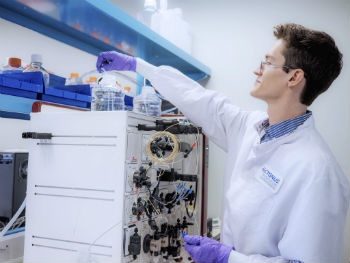
part of Cygnus offerings
Initially Cygnus worked mostly with smaller biopharma companies that lacked the resources and expertise to handle their analytics in house. But increasingly large biopharmas are turning to Cygnus as it proves its value as an industry thought leader, a product innovator and a credible partner in the regulatory process, Hoffman says.
“Some companies think it’s a risk to outsource their analytics, so they continue to do it in-house,” he says. “We’re gradually winning over those companies because, eventually, when they start looking at cost and they get trust and confidence in what you’re doing, they will eventually come to you.”
To keep pace with industry’s changing needs, Cygnus is refining a service called
orthogonal testing.
“There’s some desire by industry to go to the next level of analytics, which is to identify the individual proteins that persist in your (manufacturing) process,” Hoffman says. “Once you’ve done that, it helps you strategize how to remove the bad proteins.”
For its orthogonal testing, Cygnus uses mass spectrometry, two-dimensional western blot and a new proprietary method ̶ antibody affinity extraction ̶ that is becoming an industry standard.
“These are testing protocols that you don’t use routinely,” Hoffman says, “but you need them to characterize that your purification process is doing what it’s supposed to do, to optimize that purification process, and to characterize the impurities down to the individual level.”
Growing markets: vaccines, cell therapy, gene therapy
Cygnus has worked mostly with recombinant protein drugs, but recently vaccines have become a faster-growing business for the company.
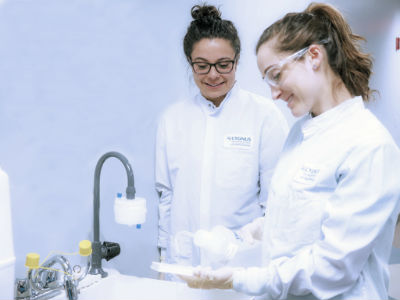
The long-established vaccine industry was held to a lesser purity standard than the newer recombinant protein industry until a few years ago when some vaccine impurities caused adverse reactions in patients.
Cygnus was quick to develop protein-impurity immunoassays for all of the commonly used host cell systems for vaccine production.
“I think the wisdom of that has been borne out,” Hoffman says. “The practice is now becoming a standard for the industry.”
A newer industry wave that Cygnus is catching is cell and gene therapy. Cygnus wants to be the first to develop analytical tools for that growing sector, which also requires purification of unwanted cellular proteins.
“We try to stay ahead of the curve by always looking at new opportunities,” Hoffman says.
To handle its growing sales and new-product development, Cygnus will hire four new employees this year and another six or seven next year, he says.
Continuity and an exit strategy
Hoffman’s greatest challenge going forward is staying focused on the company’s innovation and value creation for its customers, he says.
“As an entrepreneur, what always kept me awake at night ̶ although the company was having great success ̶ was what answer do I have for tomorrow,” Hoffman says. “As a company grows, it gets increasingly harder to keep that culture of innovation.”
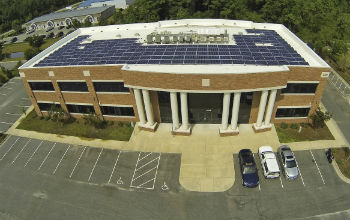
As Hoffman began contemplating retirement, he wanted an exit strategy that would ensure the company’s continued innovation and success after his departure.
“I needed to bring in some new blood to do that,” he says. “There was a lot of interest in Cygnus because of our business model, and our numbers were very good.”
In 2016 he negotiated a strategic acquisition of Cygnus by the Chicago-based private equity firm GTCR and its umbrella company, Maravai LifeSciences of San Diego.
“They were a strategic company already in the field,” Hoffman explains. Maravai had acquired three similar bioscience-tools companies prior to buying Cygnus.
Maravai helps Cygnus with business expertise, capital, processes and systems. That support gives Hoffman the freedom to focus on business development and R&D innovations.
“Maravai has been very helpful,” he says. “It’s a good relationship.”
